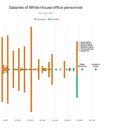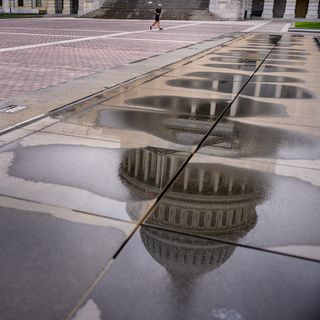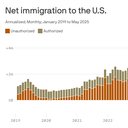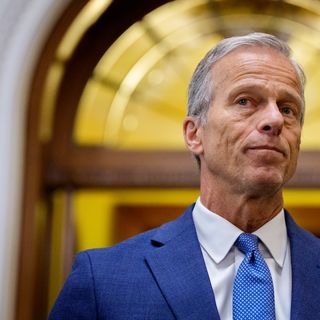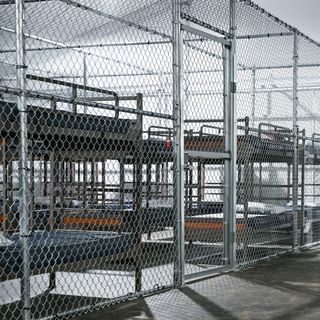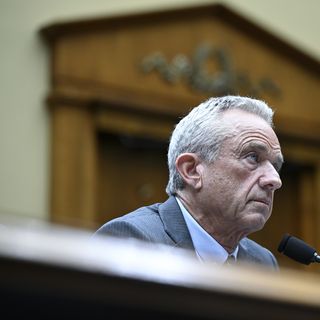Trump's asylum ban at U.S.-Mexico border "unlawful," judge rules
President Trump's asylum ban at the U.S.-Mexico border enacted in an emergency immigration proclamation on his first day in office is "unlawful," a federal judge ruled Wednesday.
Why it matters: Although U.S. District Judge Randolph Moss postponed his order from taking effect for 14 days to allow for appeal, the processing of asylum claims at the border would resume immediately if the ruling is not overturned.
- Trump administration officials have already said they'll appeal Moss' ruling that found the president exceeded his authority in a Jan. 20 proclamation that denied asylum protections at the border.
- The case seems likely headed for the Supreme Court, which last week in a majority ruling imposed new limits on lower courts' abilities to freeze federal policies.
Driving the news: The proclamation that's titled "Guaranteeing the States Protection Against Invasion" states the Immigration and Nationality Act "provides the President with certain emergency tools" that have enabled Trump's action.
- Immigration groups including the American Civil Liberties Union and multiple people seeking asylum filed a class action lawsuit in February challenging the legality of the proclamation, calling the "invasion" declaration unlawful and false.
- "[N]othing in the INA or the Constitution grants the President or his delegees the sweeping authority asserted in the Proclamation and implementing guidance," Moss wrote. "An appeal to necessity cannot fill that void."
- The Constitution doesn't give a president authority to "adopt an alternative immigration system, which supplants the statutes that Congress has enacted and the regulations that the responsible agencies have promulgated," according to the Obama-appointed D.C. judge.
Between the lines: The attempted asylum changes are among many immigration enforcement reforms the Trump administration is trying to make via executive order or rule changes without going to Congress.
- The Trump administration issued a new rule in January that dramatically expands expedited removal to immigrants who cannot prove they have been continuously living in the U.S. for over two years.
- That rule is facing a legal challenge from the American Civil Liberties Union (ACLU).
- The Trump administration also is trying to make immigrants previously granted humanitarian parole eligible for expedited removal, and that's also facing a legal challenge.
What they're saying: ACLU of Texas legal director Adriana Piñon said in a statement Moss' rejection of the Trump administration's "efforts to upend our asylum system" was "a key ruling" for the U.S.
- "This attempt to completely shut down the border is an attack on the fundamental and longstanding right to seek safety in the U.S. from violence and persecution."
- Keren Zwick, director of litigation at the National Immigrant Justice Center, which also brought the suit, said in a statement that no president "has the authority to unilaterally block people who come to our border seeking safety."
The other side: "A local district court judge has no authority to stop President Trump and the United States from securing our border from the flood of aliens trying to enter illegally," said Abigail Jackson, a spokesperson for the White House.
- "This is an attack on our Constitution, the laws Congress enacted, and our national sovereignty," she said of the ruling. "We expect to be vindicated on appeal."
- White House deputy chief of staff Stephen Miller on X claimed the order was trying to "circumvent" last week's Supreme Court ruling and that it declared undocumented immigrants as "a protected global 'class' entitled to admission into the United States."
Go deeper: Immigration crackdown ripples through economy





